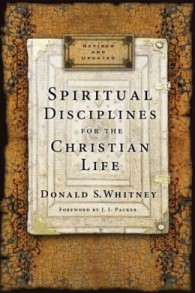Learning and training in godliness…

Theologian J. I. Packer recommends reading this book three times—once a month for three months in a row is his suggested ideal.
The spiritual disciplines are “really a restatement and extension of classical Protestant teaching on the means of grace (the Word of God, prayer, fellowship, the Lord’s Supper),” according to Dr. Packer. Disciplines, from the Latin disciplinae, simply means “courses of learning and training.”
Donald Whitney’s Spiritual Disciplines for the Christian Life has become a standard on the spiritual disciplines since first published in 1991. Dr. Packer continues in his Forward,
The foundations he lays are evangelical, not legalistic. In other words, he calls us to pursue godliness through practicing the disciplines out of gratitude for the grace that has saved us, not as self-justifying or self-advancing effort.
Dr. Whitney contends that “the only road to Christian maturity and godliness (a biblical term synonymous with Christlikeness and holiness) passes through the practice of the Spiritual Disciplines.”
[T]he urgent question every Christian should ask is, “How then shall I pursue holiness, the holiness without which I will not see the Lord? How can I become more like Jesus Christ?”
We find a clear answer in 1 Timothy 4:7: “Discipline yourself for the purpose of godliness” (NASB). In other words, if your purpose is godliness—and godliness is your purpose if you are indwelled by the Holy Spirit, for He makes godliness your purpose—then how do you pursue that purpose? According to this verse, you “discipline yourself for the purpose of godliness.”
This verse is the theme for the entire book. …
In the 2014 update and revision of Spiritual Disciplines for the Christian Life, the largest single change is the emphasis given to the discipline of meditation.
[Meditation is] deep thinking on the truths and spiritual realities revealed in Scripture, or upon life from a scriptural perspective, for the purposes of understanding, application, and prayer. Meditation goes beyond hearing, reading, studying, and even memorizing as a means of taking in God’s Word.
Making a cup of hot tea is Dr. Whitney’s way of illustrating how immersion in Scripture works.
In this analogy your mind is the cup of hot water and the tea bag represents your intake of Scripture. Hearing God’s Word is like one dip of the tea bag into the cup. Some of the tea’s flavor is absorbed by the water, but not as much as would occur with a more thorough soaking of the bag. Reading, studying, and memorizing God’s Word are like additional plunges of the tea bag into the cup. The more frequently the tea enters the water, the more permeating its effect. Meditation, however, is like immersing the bag completely and letting it steep until all the rich tea flavor has been extracted and the hot water is thoroughly tinctured reddish brown. Meditation on Scripture is letting the Bible brew in the brain. Thus we might say that as the tea colors the water, meditation likewise “colors” our thinking. When we meditate on Scripture it colors our thinking about God, about God’s ways and his world, and about ourselves. …
Reading the Bible tells the believer, for example, of God’s love. Meditation is more likely to convince him or her of it personally and, in biblically appropriate ways, to cause a person to feel loved by God.
Meditation may be more difficult for us today than it was in ancient Israel. Dr. Whitney speculates that today’s busyness and constant bombardment of information may result in “a mental distraction and dissipation that overwhelms our capacity to absorb Scripture.” But for those do read the Bible and attend church and Bible study, they may still not be transformed by Scripture.
It is possible to encounter a torrential amount of God’s truth, but without absorption, you will be little better for the experience. …
After the exposure to Scripture we need to absorb it. Meditation is the absorption of Scripture. And it’s the absorption of Scripture that leads to the experience with God and the transformation of life we long for when come to the Bible. Yes, we want to hear the read the Bible—often and much—but without the addition of meditation, warned the great man of prayer and faith George Muller, “the simple reading of the Word of God” can become information that “only passes through our minds, just as water runs through a pipe.”
“How then do we meditate Christianly?” The last half of Chapter 3, “Bible Intake … For The Purpose of Godliness,” is dedicated to answering this question. Dr. Whitney suggests starting with a suitable passage and then selecting an appropriate method of meditating. He lists 17 different methods, such as praying through the text, memorizing the text, and asking how the text applies to our individual lives. A helpful summary of these methods is available online. But even better, buy the book and get a detailed explanation of each, which is much more helpful that the mere outline. Dr. J. I. Packard’s Forward and chapter 1, “The Spiritual Disciplines … For the Purpose of Godliness,” are available online.
Don Whitney is Professor of Biblical spirituality and Associate Dean at The Southern Baptist Theological Seminary in Louisville, Kentucky. In addition to Spiritual Disciplines for the Christian Life, he is the author of How Can I Be Sure I’m a Christian?, Spiritual Disciplines Within the Church, Ten Questions to Diagnose Your Spiritual Health, Simplify Your Spiritual Life, and Family Worship. Don’s website is BiblicalSpirituality.org.


 February 17, 2015
February 17, 2015 







No comments yet... Be the first to leave a reply!